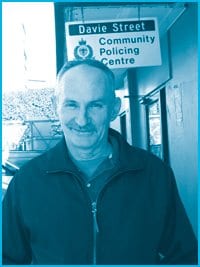Vancouver queers want to know why a member of the gay community was not appointed to the city’s empty seat on the Vancouver Police Board last month.
The police board sets the direction for the Vancouver Police Department (VPD). It hires the police chief, sets the department’s policies and approves its annual budget.
Last October, Kelly MacDonald, the board’s first female First Nations member, abruptly resigned, leaving a vacancy that needed to be filled. Two months later, Mayor Larry Campbell and city council selected Métis lawyer Terry La Liberté to take MacDonald’s place.
Though many applaud La Liberté’s selection, some members of the gay community think the next appointment should go to a gay man or lesbian.
The community needs a representative on the board who is not going to act as a “rubber stamp” for whatever the VPD or the city wants, says Davie Village Community Policing Centre president Jim Deva.
Deva points to the board’s recent decision to give Chief Constable Jamie Graham a $15,000 bonus-even though the police department overspent its budget by $4.5 million-as evidence that the board is just a “rubber stamp.”
The police board needs to be more responsive to Justice Wally Oppal’s recommendations, Deva says.
Oppal headed a commission on policing in BC in 1992 and submitted a lengthy report called Closing the Gap: Policing and the Community when he was done.
To date, Deva says, few if any of Oppal’s recommendations have been implemented.
“The role of a board is very important in the governance of police,” Oppal wrote more than 10 years ago. “The board is the employer of the police and collectively represents the community at large.”
Among other things, Oppal expressed concern about the appointment methods and effectiveness of BC’s police boards. And he urged the province to let municipalities choose the majority of police board members.
The bulk of Vancouver’s board, however, remains filled with provincial appointees. (The province appoints five of the board’s seven members.)
“We need a stronger police board than we have had,” Deva continues. “We need a board better based in the community and that reacts to community problems.”
He already has his sights set on the next vacancy. A second board member, Kenneth Bagshaw, also stepped down late last year, this time to become general counsel for the 2010 Olympics organizing committee. Bagshaw’s departure leaves a vacancy for the province to fill.
Deva is calling on gay Vancouver-Burrard MLA Lorne Mayencourt to lobby his colleagues at the cabinet table to make sure the community gets some representation this time.
Mayencourt says it’s partly up to the community. If the gay community wants to put names forward, it can do so, he says.
“I am surprised the community hasn’t nominated anyone,” he notes.
“The police board is not generally what we would call a political appointment,” he continues. Any appointments the province might consider making to the board are vetted first by the city to ensure that people with appropriate experience get picked, he says.
Deva’s hoping the nomination issue will come up at the Jan 23 rally for justice, scheduled to take place on the steps of the BC Supreme Court at Nelson and Hornby Sts.
In the meantime, lesbian city councillor Ellen Woodsworth seems satisfied with La Liberté’s appointment, but she, too, thinks the board could use some gay voices.
La Liberté is a well-known Vancouver lawyer currently fighting the extradition of John Graham, a Canadian native wanted for first degree murder in South Dakota in connection with the 1975 shooting death of American Indian Movement activist Anna-Mae Pictou Aquash.
Woodsworth says people on the police board need to be well-rooted in the issues of the community and the issues they are going to stand up for. “We need someone strong, very clear about what law and justice issues are,” she says.
She, too, turns her attention to the provincial vacancy now waiting to be filled in the wake of Bagshaw’s departure. But, Woodsworth cautions, the city is looking more toward a representative from the South Asian community to fill that spot.
But the gay community needs a voice, too, she says; it “has significant issues that need to be raised.”
Both Woodsworth and Deva think gay activist Richard Dopson, who was previously short-listed for a city appointment to the police board, would do well in Bagshaw’s old seat.
“He’s the kind of conciliator that would be amazing on that board,” Deva says.
“Richard would be great,” Woodsworth agrees. “He would be very constructive.”
Dopson says he’s going to send the police board a notice that he would like his application reconsidered for the position.
He thinks the police board could use someone to act as a liaison to the gay community and put forward its issues in a sensitive manner.
“I wouldn’t be afraid to bring those issues forward,” says Dopson, who has also been president of the Gay and Lesbian Community Centre, worked on the Gay Games and served on the Vancouver Pride Society’s board.
But, offers Woodsworth, while the city may vet the appointments, it doesn’t formally go before council and anyone applying would do well to have some Liberal support-federal and provincial-behind them.
La Liberté’s appointment reportedly took place in a private, in-camera council meeting.
Deva is not hopeful about the board becoming anything more than a “rubber stamp” in the near future.
“I don’t have very high hopes that anybody might stir the water or create any sort of ripples,” he says.
In his report, Oppal said police board members may be well intentioned, but they generally do not receive adequate direction or training.
“Many board members feel it is their function to be advocates for the police department. These problems are common to boards across Canada,” Oppal wrote.
“Many board members simply do not appreciate the nature and importance of their duties.”

 Why you can trust Xtra
Why you can trust Xtra


